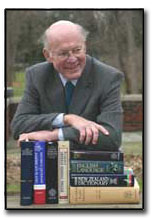October 2005
Talking about words: Big Words—or how the English language got so bodacious
with Richard W. Bailey
Until 1700, most English intellectuals thought that there was no future for their language. Important writings would reach an international audience (and be intelligible to future generations) only if they were written in Latin.
There were lots of things wrong with the English language, not least that it was spoken only by a tiny handful of people on a fog-bound island at the northern end of civilization. But more important, they thought, English was ill-suited for complicated ideas and beautiful compositions.
English lacked copiousness. That is, it didn't have a vocabulary nearly big enough to deal with important concepts. It didn't even have the word copiousness for an abundance of words until 1642.
So the thinkers set about borrowing words from classical languages to make up the intellectual deficit. A lot of words from rhetoric, medicine and theology were adapted to English: paronomasia (1579), cerebellum (1565), concelebrate (1572). New words flooded into English.
It wasn't just that English didn't have enough words. English had too many of the wrong kinds of words—particularly monosyllables clotting the language with unmelodious clusters of consonants. Italian was a language for song and rhyme. Latin for good, long, beautiful words. English was a "northern language," like German a mass of snarls and grunts. Who could make poetry from words like edge or choke? With so many words like that, English was crunked.
So there arose a taste for words that were both long and used just one consonant and one vowel one after the other: sussuration, lollapalooza, melodeon, tintinnabulation. These long wonderful words were just what English needed.
In America, the frontier humor of the 1830s needed ripsnortin' polysyllables, and the word-makers did their best to make the words as long as they could: bodacious, calathumpian, sockdollage and snollygoster. For English to be transcontinental, it needed boxcars of long words to get there.
In 1872, Mark Twain invented a polysyllabic clergyman who said this to a cowboy: "Would it not expedite matters if you restricted yourself to categorical statements of fact unencumbered with obstructing accumulations of metaphor and allegory?" The parson would have done better, under the circumstances, with "Hunh?"
We like big words: supercalifragilisticexpialidocious.
In January 2005, the American Dialect Society could find no better word newly introduced into English than luanqibaozhao. It comes from Chinese and means 'a complete mess'.
Sometimes we love them to pieces. Like a deeply loved child's toy, the pieces fall off through wear: prep, phone, Philly.
For all of our love for them, they make us uneasy.
Shakespeare showed us fools with a love of the loquacious. We delight in seeing a windbag punctured. In Hamlet, Polonius is fond of words like encompassment and phrases like scene individable. Like Hamlet, we find him ridiculous.
The humorist Marietta Holley, Mark Twain's contemporary (see http://guweb2.gonzaga.edu/faculty/campbell/enl311/holley.htm)
caught the humor of big words in representing the effusions of a rural orator: "My friends we are in one sense but tennifolious blossoms of life; or, if you will pardon the tergiversation, we are all but minneratin' tennirosters hovering on an illininition of mythoplasm."
In The Wizard of Oz, Professor Marvel introduces his flight back to Kansas with these high-sounding words: "I, your Wizard per ardua ad alta, am about to embark upon a hazardous and technically unexplicable journey into the outer stratosphere." However worried we are about Dorothy's fate at that point, we are not sorry to see his exit ruined when the balloon takes him away.
Big words are sneaky. They can be mendacious. Slickers use them to put something over on the downright.
Travis Tritt, the country-western singer, captured our worries about big words in "A little rough around the edges."
I'm a little rough around the edges
I don't come out of no GQ magazine
I don't use a lot of big words
But I'm bent on love if you know what I mean.
I ain't int'rested in bein' politically correct.
I stand right up and say what I believe.
Educated at costly and selective private schools where big words abound, President Bush appeared in 2004 at rallies where this chorus was played during the rope walk. It was a brilliant way of showing that he's a plain-folks fella who wouldn't fool us with big words.
No mendacity hereabouts. No-siree.
Editor's note:
Washtenaw Community College names library for Richard Bailey
 Richard W. Bailey is the Fred Newton Scott Collegiate Professor of English. His most recent book is Rogue Scholar: The Sinister Life and Celebrated Death of Edward H. Rulloff, University of Michigan Press, 2003--a biography of an American thief, impostor, murderer and would-be philologist who lived from 1821 to 1871. It was published by the University of Michigan Press in 2003.
Richard W. Bailey is the Fred Newton Scott Collegiate Professor of English. His most recent book is Rogue Scholar: The Sinister Life and Celebrated Death of Edward H. Rulloff, University of Michigan Press, 2003--a biography of an American thief, impostor, murderer and would-be philologist who lived from 1821 to 1871. It was published by the University of Michigan Press in 2003.
|

 Richard W. Bailey is the Fred Newton Scott Collegiate Professor of English. His most recent book is Rogue Scholar: The Sinister Life and Celebrated Death of Edward H. Rulloff, University of Michigan Press, 2003--a biography of an American thief, impostor, murderer and would-be philologist who lived from 1821 to 1871. It was published by the
Richard W. Bailey is the Fred Newton Scott Collegiate Professor of English. His most recent book is Rogue Scholar: The Sinister Life and Celebrated Death of Edward H. Rulloff, University of Michigan Press, 2003--a biography of an American thief, impostor, murderer and would-be philologist who lived from 1821 to 1871. It was published by the 